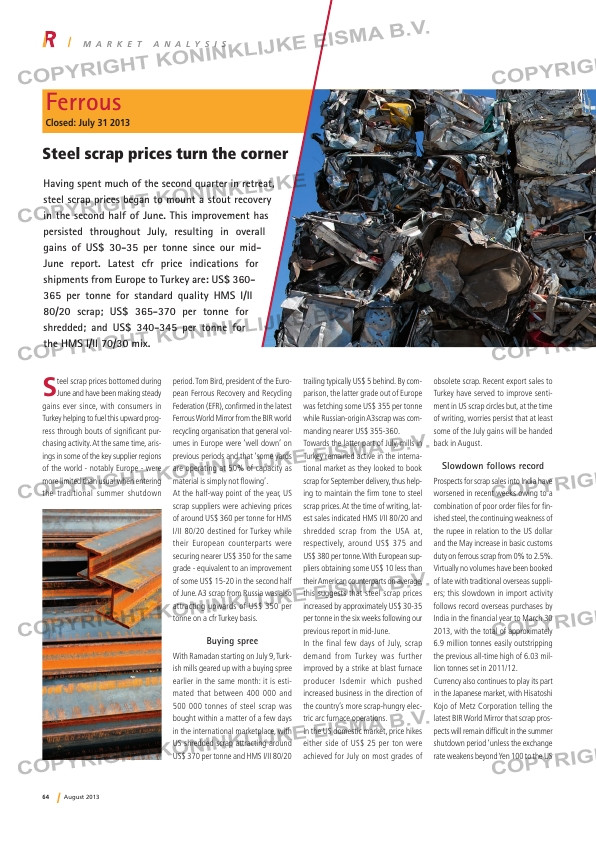Page 64 from: August 2013

64 August 2013
m a r k e t a n a l y s i s
Ferrous
Steel scrap prices turn the corner
Having spent much of the second quarter in retreat,
steel scrap prices began to mount a stout recovery
in the second half of June. This improvement has
persisted throughout July, resulting in overall
gains of US$ 30-35 per tonne since our mid-
June report. Latest cfr price indications for
shipments from Europe to Turkey are: US$ 360-
365 per tonne for standard quality HMS I/II
80/20 scrap; US$ 365-370 per tonne for
shredded; and US$ 340-345 per tonne for
the HMS I/II 70/30 mix.
Closed: July 31 2013
Steel scrap prices bottomed during June and have been making steady
gains ever since, with consumers in
Turkey helping to fuel this upward prog-
ress through bouts of significant pur-
chasing activity. At the same time, aris-
ings in some of the key supplier regions
of the world – notably Europe – were
more limited than usual when entering
the traditional summer shutdown
period. Tom Bird, president of the Euro-
pean Ferrous Recovery and Recycling
Federation (EFR), confirmed in the latest
Ferrous World Mirror from the BIR world
recycling organisation that general vol-
umes in Europe were ‘well down’ on
previous periods and that ‘some yards
are operating at 50% of capacity as
material is simply not flowing’.
At the half-way point of the year, US
scrap suppliers were achieving prices
of around US$ 360 per tonne for HMS
I/II 80/20 destined for Turkey while
their European counterparts were
securing nearer US$ 350 for the same
grade – equivalent to an improvement
of some US$ 15-20 in the second half
of June. A3 scrap from Russia was also
attracting upwards of US$ 350 per
tonne on a cfr Turkey basis.
Buying spree
With Ramadan starting on July 9, Turk-
ish mills geared up with a buying spree
earlier in the same month: it is esti-
mated that between 400 000 and
500 000 tonnes of steel scrap was
bought within a matter of a few days
in the international marketplace, with
US shredded scrap attracting around
US$ 370 per tonne and HMS I/II 80/20
trailing typically US$ 5 behind. By com-
parison, the latter grade out of Europe
was fetching some US$ 355 per tonne
while Russian-origin A3scrap was com-
manding nearer US$ 355-360.
Towards the latter part of July, mills in
Turkey remained active in the interna-
tional market as they looked to book
scrap for September delivery, thus help-
ing to maintain the firm tone to steel
scrap prices. At the time of writing, lat-
est sales indicated HMS I/II 80/20 and
shredded scrap from the USA at,
respectively, around US$ 375 and
US$ 380 per tonne. With European sup-
pliers obtaining some US$ 10 less than
their American counterparts on average,
this suggests that steel scrap prices
increased by approximately US$ 30-35
per tonne in the six weeks following our
previous report in mid-June.
In the final few days of July, scrap
demand from Turkey was further
improved by a strike at blast furnace
producer Isdemir which pushed
increased business in the direction of
the country’s more scrap-hungry elec-
tric arc furnace operations.
In the US domestic market, price hikes
either side of US$ 25 per ton were
achieved for July on most grades of
obsolete scrap. Recent export sales to
Turkey have served to improve senti-
ment in US scrap circles but, at the time
of writing, worries persist that at least
some of the July gains will be handed
back in August.
Slowdown follows record
Prospects for scrap sales into India have
worsened in recent weeks owing to a
combination of poor order files for fin-
ished steel, the continuing weakness of
the rupee in relation to the US dollar
and the May increase in basic customs
duty on ferrous scrap from 0% to 2.5%.
Virtually no volumes have been booked
of late with traditional overseas suppli-
ers; this slowdown in import activity
follows record overseas purchases by
India in the financial year to March 30
2013, with the total of approximately
6.9 million tonnes easily outstripping
the previous all-time high of 6.03 mil-
lion tonnes set in 2011/12.
Currency also continues to play its part
in the Japanese market, with Hisatoshi
Kojo of Metz Corporation telling the
latest BIR World Mirror that scrap pros-
pects will remain difficult in the summer
shutdown period ‘unless the exchange
rate weakens beyond Yen 100 to the US
RI-6_MA-Ferrous.indd 64 05-08-13 09:18



